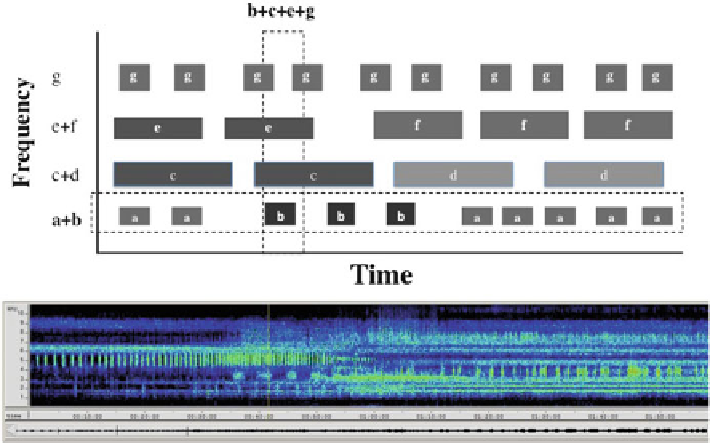Biology Reference
In-Depth Information
Fig. 3.10
Schematic representation of acoustic repartition across frequencies and time of the
individual repertoire of different vocal species (
a-g
) and a spectrogram (Reproduced with permis-
sion from David Monacchi) from an African tropical forest (
lower
) showing the dense repartition
of sounds that belong to the frequencies
versa, found that the feeding niche was changed and that the new habits were
conserved during life in experimental individuals. This work opened a grand vista
to the mechanism that allows species to coexist.
Habitat selection and behavior can modify call properties in animals. In
environments with a high diversity of vocal animals, spectral and temporal overlap
should be reduced to avoid masking and confused signals (Krause
1993
) (Fig.
3.10
).
The acoustic niche hypothesis, as named by Bernie Krause in 1980 (Krause
2012
), posits that the sound spectrum is a limited resource and that species try to
reduce and minimize acoustic competition. The acoustic niche can be defined as
partitioning into a frequency space the sounds of animals to reduce the interspecific
masking effect. This frequency partitioning has been documented in bats, for
example.
The acoustic niche hypothesis is related to the evolution of habitats and the time
lag of coexisting species, as recently pointed out by Malavasi and Farina (
2013
).
The acoustic niche hypothesis has been proved in birds, frogs (at least some),
and in some species of cicadas. In this last group of insects Sueur (
2002
) has
observed reduction of acoustic heterospecific overlap.
However, this expectation was not demonstrated in a recent investigation by
Planqu
`
and Slabbekoorn (
2008
) in a Peruvian bird assemblage. These authors did
not find a negative correlation between spectral and temporal overlap. Exploring
the acoustic behavior of 20 vocally dominant species from 14 families, they did not
find a significantly lesser correlation between spectral and temporal overlap. The

Search WWH ::

Custom Search